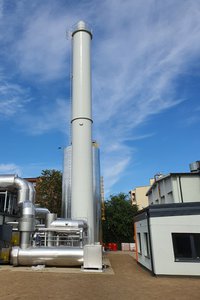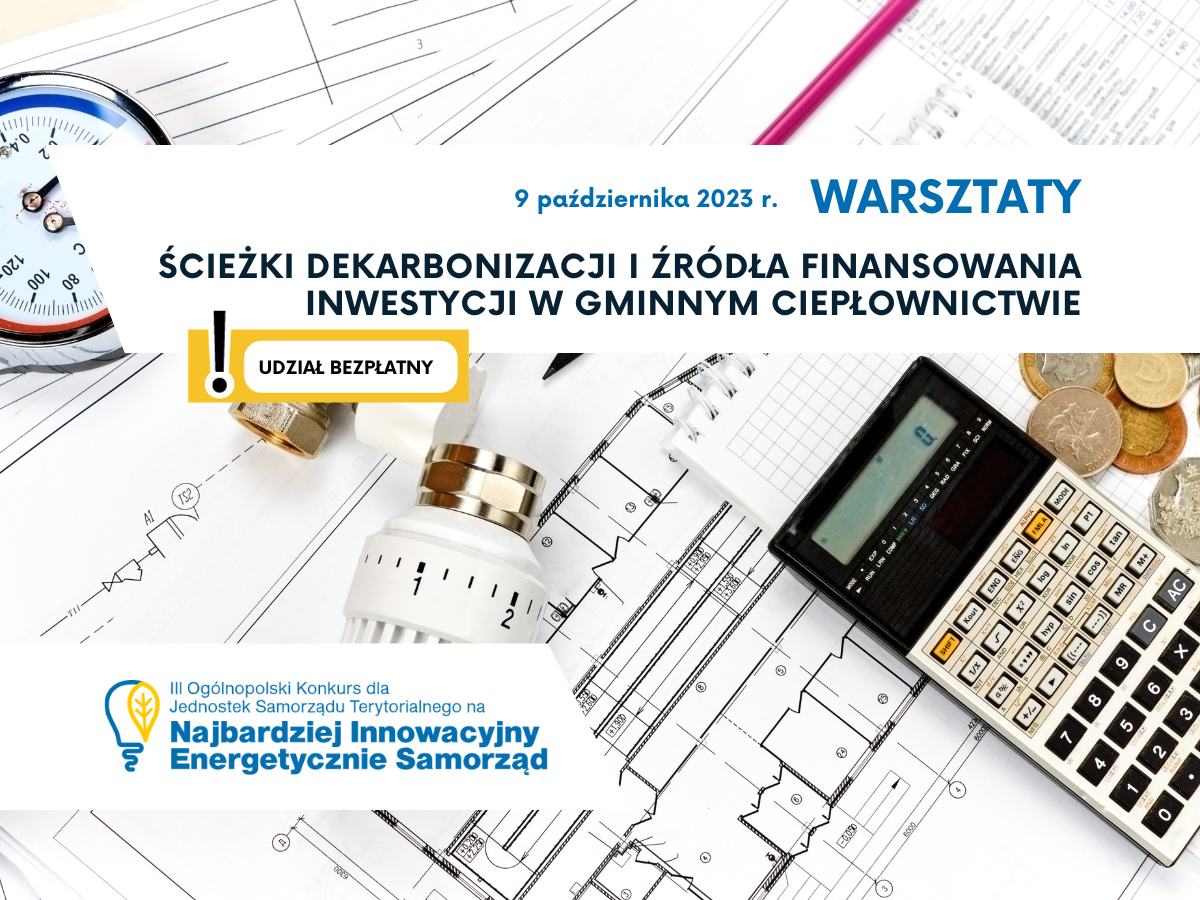Why is it important for us to invest in the heating industry?
Poland's district heating network is 22,000 km long and supplies about 15 million consumers. Similar to Germany, it is one of the largest markets for system heating in Europe. However, Polish district heating is still based on fossil fuels in about 80 % (coal is the dominant fuel -hard coal statistics compiled by the ARP Katowice branch are available here).
Only one-fifth of heating system meet the criteria for an energy-saving t system required by the EU when applying for funding. Therefore, investments are needed in the district heating sector to reduce both heat production costs and carbon footprint.
ARP S.A. supports energy transformation
In 2021, ARP S.A. started work on creating the right tools for launching green investments - investments in the energy transition in Poland. We are involved in the development of Offshore Wind Energy in the Baltic Sea, and we are also co-creating hydrogen valleys, which are regional ecosystems using zero-emission hydrogen in the economy. These are multi-sectoral ventures, fundamental to building a hydrogen economy in Poland. They involve government and local administration, business, industry, science and NGOs. These are complemented by the standard offer of ARP S.A. financial instruments - available here.
Hydrogen for heating
In two hydrogen valleys in which ARP S.A. is involved, projects related to the transformation of the heating industry and the use of hydrogen are being developed today. In the Subcarpathian Hydrogen Valley - a project in Sanok and Nowa Sarzyna. In the Lower Silesian Hydrogen Valley - the Lusatian Hydrogen Hub project, where a heating plant would be the recipient of hydrogen. It is worth mentioning that the European Union intends to allocate as much as one trillion euros for the hydrogen transition by 2050.
Competition for local governments and municipal heating plants
ARP S.A. is the general partner of the III. Edition of the Competition for the Most Innovative Energy Local Government. The purpose of the Competition is to identify and reward municipalities most involved in the modernization of the energy sector, contributing to the implementation of energy and climate policy assumptions. The competition is intended to consolidate and popularize knowledge about the activities undertaken by local governments in the field of sustainable energy transformation.
In the competition category - Most Energy Innovative Local Government, the winners were:
- Lidzbark Warmiński Municipality (area Investment of the Year - transport)
- Bieliny Municipality (area Investment of the Year - construction)
- Dzierzgoń Municipality (area Investment of the Year - construction).
In the second competition category - Aspiring Innovator of the Year in the field of heating, the first place went to the municipality of Gliwice from the Silesian province. The municipality's planned investment is the Green Energy Park - expansion of the existing heating plant with a steam unit with a multi-fuel boiler producing heat and electricity in high-efficiency cogeneration planned for implementation on the premises of PEC-Gliwice Sp. z o.o. The presented solutions are consistent with European Green Deal policy, the 3W idea and local strategic documents.
The main prize in the second category is an invitation to implement a project, i.e. to prepare a decarbonization plan for a selected district heating plant based on the ELENA instrument without input costs - i.e. the municipality does not bear the costs of preparing investment documentation for the energy transformation of the district heating plant (SIWZ feasibility study, investment consulting), provided that the conditions required for support under the ELENA instrument are accepted.

In 2022, ARP S.A. was the Strategic Partner in the 2nd edition of the Competition for the Most Energy Innovative Local Government. Together with the Ignacy Lukasiewicz Institute for Energy Policy, a competition category was created for municipalities and municipal heating plants for the best concept for modernizing heating plants towards green heat. The criteria were: CO2 reduction, technology used, and cost-effect (where is the greatest benefit from the transformation of heat sources).
The winners of the Aspiring Innovator of the Year in the field of heating in 2022 were PEC Minsk Mazowiecki and the city of Minsk Mazowiecki. The prize was the preparation of investment documentation for the modernization of heat sources in Minsk Mazowiecki. Its founders were ARP S.A., Bank Gospodarstwa Krajowego S.A., SBB Energy S.A and the National Energy Conservation Agency S.A. At the end of 2022, an agreement was finalized for the preparation of 3 variants for the modernization of heat sources in PEC Minsk Mazowiecki.
"Decarbonization paths and sources of financing for investments in the municipal heating sector".
As a part of the "Aspiring Innovator of the Year in the field of heating" Competition, workshops are conducted at the headquarters of ARP S.A. for Local Self-Government Units and Heat Power Companies.
The purpose of the workshop is to equip representatives of the Local Self-Government Units and PECs with comprehensive knowledge about heating, with particular emphasis on the possibilities of financing modernization and legal and technical conditions
In 2023, the thematic scope of the workshop included three modules:
- Regulations and thet heating market in Poland: regulatory changes in heating in 2023, municipal heat supply plans and opportunities, challenges and threats for the district heating sector
- Financing: current possibilities of financing the transformation of heating by the National Fund for Environmental Protection and Water Management, the FENIKS program and the ELENA program of the European Investment Bank
- Workshop part: discussion of examples of investment implementation in Poland in the range of 1-50 MW in ct heating plants and creating an outline plan for decarbonization of own PEC

E-mail adress: cieplownictwo@arp.pl
THREE EXAMPLES OF MODERNIZATION OF HEAT SOURCES IN POLAND
Current trends in heating
A "new generation" of heating using clean energy - geothermal, solar or low-temperature waste heat sources - is emerging. Such sources are widely available in many regions, although they are still underutilized, sometimes due to incompatibility with the energy infrastructure.
Case study 1: Szlachęcin
A positive example of the use of clean energy is an investment for Veolia Energia Poznan in Szlachęcin, implemented on the site of a wastewater treatment plant owned by Aquanet. The cogeneration installation was combined with waste heat recovery from wastewater. The electrical power of the cogeneration system is about 1 MW, of which 700 kW is used to power the heat pump, and the remaining amount is sold to the national power system. The thermal capacity of the system, combined CHP and heat pump, is about 2.9 MW.
The system is capable of producing annually more than 38,000 GJ of heat recovered from waste water by the heat pump, 29,000 GJ from the gas-powered cogeneration system, and about 7.7 MWh of electricity. The solution used reduces emissions of CO2, sulfur compounds and dust and lowers the temperature of wastewater.
Case study 2: Lidzbark Warmiński
Two demonstration heating projects using heat pumps are being built in Poland: in Sokolow Podlaski and Lidzbark Warmiński. In Lidzbark, a pilot project is being created by Euros Energy on the plot of a heating plant owned by Veolia Północ. The Euros Energy HC Plant of the Future uses locally available renewable energy sources, allowing it to achieve almost full decarbonization. The plant provides 90% RES in the balance and a supply temperature of 80⁰C. In this way, it meets the requirements for modern modernized heating systems. Efficient reversible heat pumps are integrated with three lower sources: air heat exchangers, low-temperature ground storage and high-temperature water storage. The system is powered by electricity produced directly on site from PVT hybrid solar collectors and a nearby PV photovoltaic installation. On winter nights, the system is supported by electricity supplied from the National Grid. The zero-carbon heat storage used from summer to winter resulted in a total SCOP value for the heat pump system of 3.5. An SCOP value at this level guarantees that a minimum of 70% of the heat comes from renewable sources, even if all of the electricity was produced from coal. In the case of Lidzbark, most of the required electricity is generated locally from photovoltaic panels.
Case study 3: Sokołów Podlaski
Another solution developed for Sokolow Podlaski is based on the direct use of biogas, but also includes biomethane production. It can be used in agricultural regions with high potential for biogas and biomethane production. The separate municipal heating network will be powered by energy generated by a system of combined heat and power (CHP) engines, heat pumps and a biogas boiler, where the fuel will be biomethane of agricultural origin, and in the future biomethane from industrial and municipal waste. The municipal heating network will supply heat with parameters of 80/60⁰C, while in the future the parameters can be lowered to 70/50⁰C, which will help reducing losses in the heating network. The cogeneration system, powered by biomethane, will produce electricity and heat from stored green energy. It will be possible to manage the operation of the CHP module by storing the generated biogas and intelligently controlling the operation of the heat pumps.









